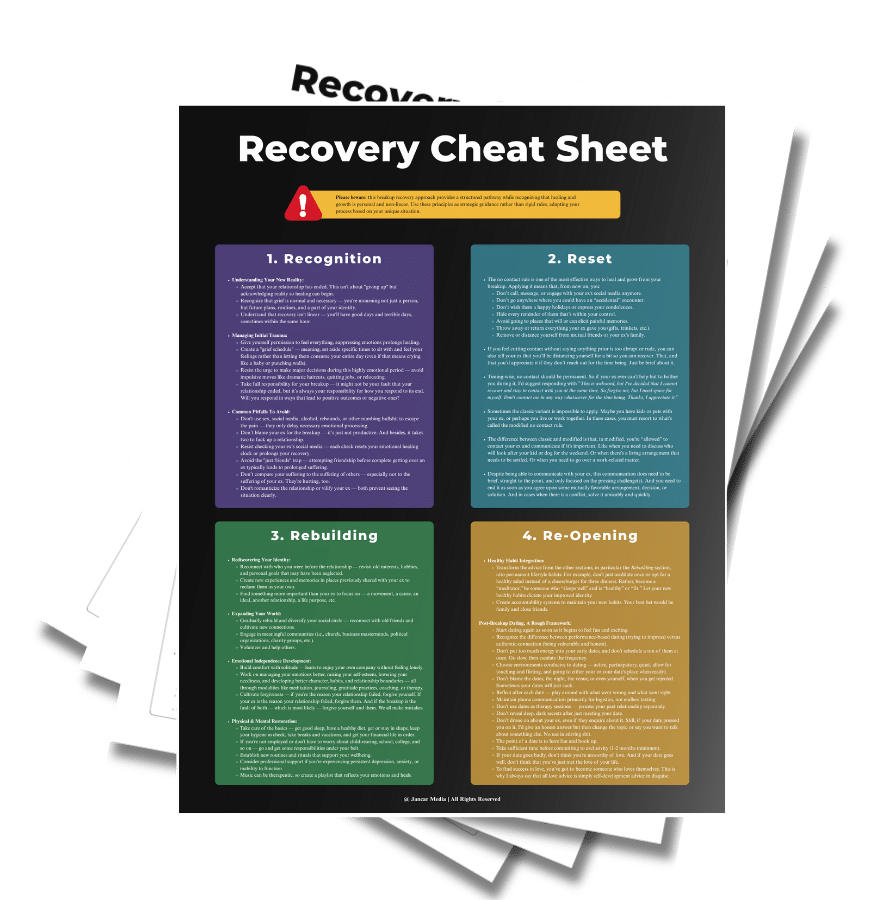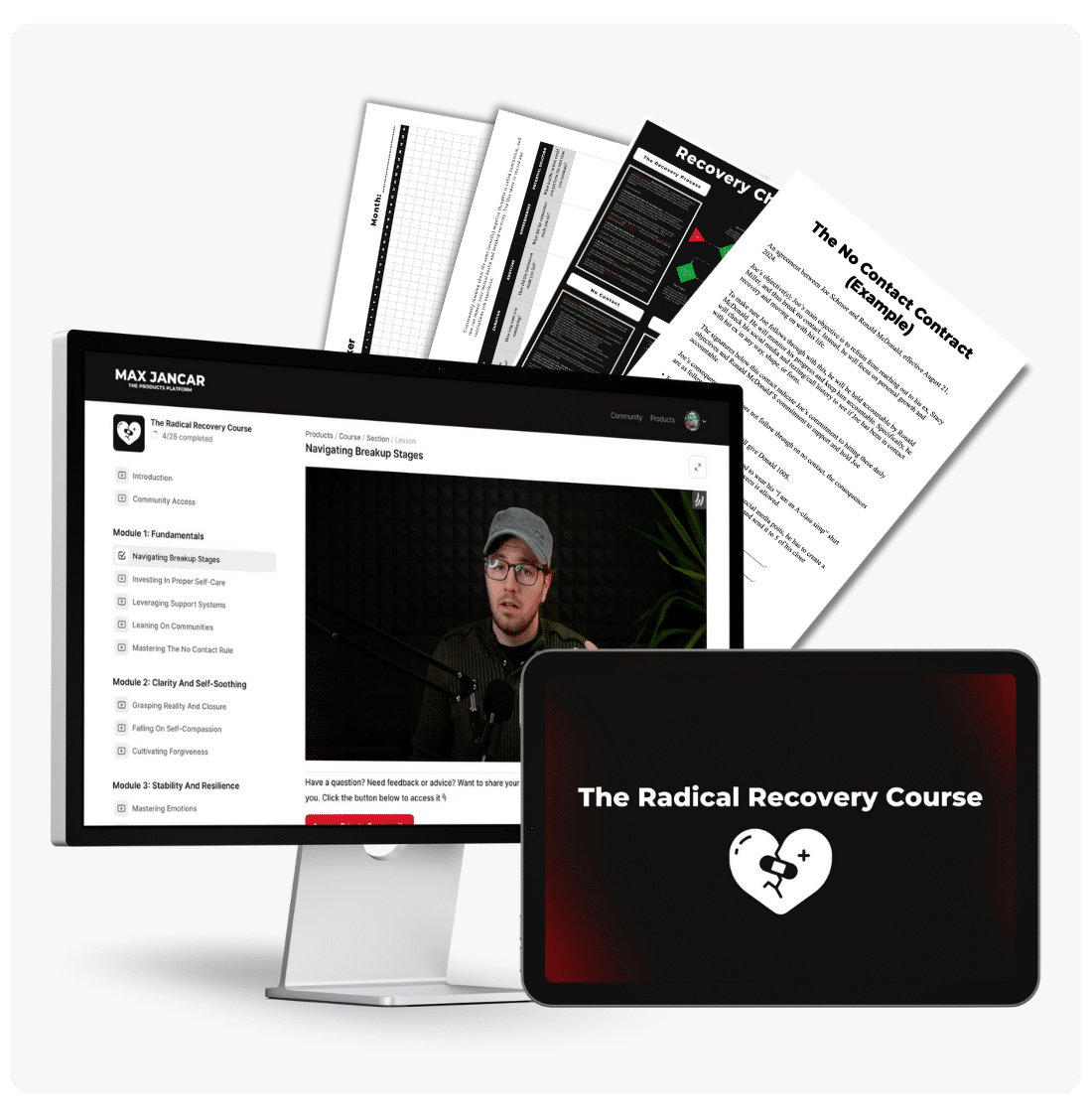Click play to listen to this article.
While not always perfect, therapy remains the most effective and prevalent solution for most heartbreak-related problems. However, what holds people back from actually getting into therapy after a breakup are all the bullshit stereotypes attached to it.
Some think it all revolves around curling up on a couch and choking back sobs. Some think of it as nothing but interpreting ink blots (which, for some reason, always resemble my attempts at getting a Bachelor of Fine Arts degree). Others think therapy is primarily synonymous with mainlining on pills.
Spoiler alert: none of this is real therapy. Real therapy is much more mundane and personal. It also contains much less drama.
A guide to breakup recovery based on embracing discomfort, extracting wisdom from dark moments, and healing through evidence-based practices.
Order Your CopyWhat Therapy Is And How It Looks Like
Therapy is about helping you make your unconscious feelings, thoughts, and insecurities conscious and then teaching you how to exert control over them so they don’t hold you back anymore.
Let me illustrate this for you.
Imagine you get aggressively jealous whenever you see your ex hanging out with someone new, perhaps a friend you don’t know or a potential mate. And I do mean aggressively jealous: a tight knot in your stomach, clenched jaw, cold and clammy hands, a seething desire to kick someone’s teeth in.
To add insult to injury, let’s say that due to your jealousy, you’re chronically pissed off. So you start needlessly lashing out at the people you care about, which only pushes them away and causes drama. As a result, loneliness ensues.
Enter: therapy.
By engaging in therapy, you can, for a start, delve into your relationship history and emotional background to uncover where this unusually intense jealousy stems from.
Perhaps from being bullied throughout high school, which led to low self-esteem that then made you doubt your value in relationships. Maybe the jealousy stems from a previous ex who fucked your best friend while you were together. Or perhaps it stems from your alcoholic dad who made beating you senseless a weekly family tradition.
Whatever the case, a therapist can help you safely and comfortably identify the underlying causes of your jealousy. And once uncovered, they can show you how to manage the emotion as well as your behavior in spite of it.
Put another way, a therapist teaches you how to disassociate and detach from your jealousy and respond to it in a way that doesn’t lead to negative outcomes.
Types Of Therapy Most Useful Post-Breakup
There are loads of different types of therapy to choose from: Dialectical, Behavioral, Existential, Psychodynamic, Humanistic, Gestalt, Interpersonal, Jungian, Psychoanalysis, and, everyone’s favorite, Family Therapy.
The cool part about these types of therapy is that they all work to some extent and produce, on average, a relatively similar result. (1) (2)
That said, there are a handful of therapy types that work exceedingly well for breakup-related problems. These are as follows.
1. Cognitive Behavioral Therapy (CBT)
This type of therapy is about dealing with the here and now — your current problems and how to resolve them. The core idea is pretty simple: your emotions are directly tied to your thoughts and actions.
So, if you’re feeling off, it might just be because of how you think or what you’re doing. Therefore, if you change the way you think and act, you can potentially improve how you feel day-to-day.
2. Narrative Therapy
This therapy primarily revolves around getting you to externalize your breakup and see it as a separate entity from yourself. As you’d guess if you’ve come so far in the article, this is exactly what makes a breakup more manageable.
Because when you get some distance from it, you gain an opportunity to completely rewrite the experience in a way that leads to positive outcomes instead of negative ones. Put differently, you’re able to see the whole shitshow as a gift rather than a curse.
3. Acceptance And Commitment Therapy (ACT)
A relatively new type of therapy and sub-type of CBT that uses mindfulness and acceptance approaches to help people more effectively relate to their emotions and take control of their behavior.
Compared to other types of therapy, a key part of ACT is that it’s the least analysis heavy — so there’s not much thought evaluation or excavation going on. While not everyone’s cup of tea, lots of people — including myself — love this approach.
4. Group Therapy
This is essentially a gathering of people grappling with similar heavy stuff. It’s a space where you can share your problems and potential solutions and receive support, reassurance, and advice.
However, the real magic of group therapy is the sense of community it fosters. Suddenly, you’re not battling your breakup in isolation; you’ve got a crew backing you up, keeping you accountable so you don’t make healing-hindering mistakes like seeking revenge through shitting on your ex’s doorstep.
An online interactive video course that teaches you how to get past a breakup so you can create a new possibility for love (with your ex or someone new).
Get Instant AccessProblems When Getting Therapy After A Breakup
Therapy receives a lot of criticism, and although most of it is pretty dumb and inaccurate, some is legit. So if you’re thinking about starting therapy or are currently undergoing therapy, here are a few things to be mindful of.
1. Having The Wrong Mindset
Many people think that just by showing up to therapy and settling into a comfy chair, they’re going to be fixed. But that’s bullshit.
Therapy is not a spectator sport. It’s more like a mental gym, where the therapist takes on the role of a personal trainer. You wouldn’t expect to get fit just by watching your trainer lift weights, right? Well, the same goes for therapy; you’ve got to do the heavy lifting.
If you’re not willing to actively engage and work hard, even the best therapist can’t make much of a difference. Essentially, if therapy is working, it’s probably because you’re putting in most of the effort.
2. Getting Addicted To Therapy
Like breakup advice, therapy operates under the same simple rule: its effectiveness is measured by how many people stop needing it. So a good sign that your therapy is working is if you eventually leave it behind.
However, some people still stick with therapy for years without substantial progress, often falling into a comfortable but unproductive routine.
Initially, therapy might reveal significant issues and foster change, but over time, it can stagnate into a loop where the therapist repeatedly validates the same problems without offering new insights.
This cycle can make therapy feel reassuring rather than transformative. And this is precisely the point at which therapy loses its actual value.
True therapy should be challenging and a bit uncomfortable. It should push you to see your life from new angles and not just revolve around making you feel good.
Therefore, if your sessions become repetitive and you can sense they no longer provoke thought or growth, it might be time to seek a different therapist or explore alternatives.
3. Mistaking Psychiatrists For Psychologists
Psychiatrists are the ones who can prescribe medications, and they primarily tackle mental illnesses with a medical approach. Psychologists, on the other hand, typically don’t prescribe meds. They’re more about diving deep into your thoughts and behaviors through, well… classic therapy.
The latter is who you want to look for when dealing with a breakup. A psychiatrist, and by extension, the pills they prescribe, should be considered only if you suffer from a mental illness, or when it’s been months since your breakup yet nothing has helped you feel any better.
4. Settling For Your First Therapist
Choosing the right therapist is paramount; so try to approach it as if hiring for a critical role in a business.
For example, take advantage of the free consultations most therapists offer to gauge compatibility. Your sessions will be dramatically more effective if you have a natural connection with your therapist and an aligned lifestyle and worldview.
Also, before you commit to anyone, take a moment to really think about what you’re looking for in a therapist and whether or not your current therapist is meeting those needs.
5. Believing Breakup Coaching Is Superior
Even if you’d woke me up at motherfucking midnight, I’d passionately argue that therapy is dramatically more effective than any type of breakup coaching out there.
But why do most people who follow breakup advice then think it’s the other way around?
Well… because breakup coaching exists in a practically unregulated industry, where savvy marketers can always present it as a supremely better alternative to therapy.
For instance, there is nothing stopping me from promising that you’ll get over your ex in under two weeks if you work with me (yes, this is a common claim in our space and no, therapists aren’t allowed to make it). I can also promise that my coaching is oh-so-better than therapy for a variety of reasons — all of them made up, of course.
And guess what? Some gullible idiot will fall for my trick. And those who won’t, usually can’t do anything about it. Unregulated industry, remember?
Take it from someone who had loads of therapy and who occasionally does breakup coaching himself — while breakup coaching does have it’s uses, if you have to choose one, therapy is always the better investment.
Don’t let the savvy marketers convince you otherwise. It’s a trap.
Signs You Might Need Therapy After a Breakup
Here are six signs that it’s probably high time for therapy, listed in no particular order. The more of them you notice in yourself, the better it would be to see someone.
Sign #1: Prolonged Sadness
It’s normal to feel sad after a breakup. Still, if the sadness lingers and starts to affect your daily functioning, you should probably get therapy, especially when that sadness begins to morph into persistent feelings of emptiness and depression.
This would look like feeling as though nothing you do matters, losing all interest in hobbies and activities you normally enjoy, or having severe and chronic difficulty with focus and sleep (i.e., you’re constantly lethargic and low energy and you either can’t fall asleep or you keep oversleeping).
These are just some early warning signs that most people overlook — if you notice them, treat them ASAP.
Sign #2: Constant Rumination
If you find yourself unable to stop thinking about your ex, are constantly checking their social media, and keep idealizing or romanticizing past moments with them, you’re probably stuck in a nasty rumination loop that therapy could help you break out of.
While you can opt for any type of therapy, and it would probably help, I would specifically look into Cognitive Behavioral Therapy to treat this problem. Because according to the latest studies, this form of therapy remains the most effective in resolving rumination. (3)
Sign #3: Abrupt Impulses
We all struggle with impulses sometimes, especially after a breakup when emotions run the show.
We keep stalking our ex on social media, desperately searching for hints that they miss us, even though the behavior makes us obsess about them more. We keep calling and texting our ex, even though it causes unnecessary drama. We keep getting into new relationships to drown out our pain and loneliness, only to find ourselves naively wondering why they all keep imploding.
If you find yourself frequently giving in to your post-breakup impulses, whatever they may be, you should probably consider therapy. Simple as that.
Sign #4: Compulsive Behavior
In moderation, compulsive behaviors are usually harmless — a glass of wine, an episode of that new Netflix slop, a quick jerk off to a hot porno. These all help to get our mood up.
However, if left unchecked, these behaviors can start sabotaging various areas of our life, and that’s when they become a problem for both our mental and physical health.
So if you find yourself repeatedly succumbing to your compulsive behaviors and you feel you can’t do much to manage them constructively by yourself, you should get a therapist to give you a hand.
Sign #5: Low Self-Esteem
Breakups can often lead to a significant hit to one’s self-esteem. And then this plunge in self-esteem can pave the way for some pretty nasty repercussions.
Among the most common ones are chronic worry, social withdrawal (to avoid judgment or criticism), negative self-talk, self-blame, self-criticism, feelings of inadequacy and worthlessness, and, of course, proneness to anxiety and depression.
Therefore, if you feel that your self-esteem fell a few notches and you have a hard time raising it yourself, you should probably see a therapist.
Sign #6: Toxic Ex Relationship
If your ex-relationship involved cheating, lying, manipulation and games, or abuse (either physical or emotional), therapy is an excellent idea.
Therapy can help you unravel the complex feelings you’ve been left with and address any trauma, irrational fears, and trust issues that so often accompany relational toxicity.
Additionally, it can provide a safe space to explore and express the anger, betrayal, and sadness that often come with toxic relationships, which allows you to process these emotions and move on faster as a result.
Conclusion: Maybe You Should Get Therapy After A Breakup
In the end, there is no shame in getting therapy. In fact, it could be the difference between a silky-smooth post-breakup recovery and one full of obstacles and agonizing crapfests.
Fortunately, getting therapy is easier than ever with this article’s sponsor, Online Therapy. Here are three simple reasons why you should give them a shot.
Reason #1: flexibility at your fingertips. Engage with licensed therapists how you want, when you want. Whether it’s through text, voice calls, or video sessions, tailor your therapy to fit your lifestyle.
Reason #2: an entire library of self-improvement resources. Once signed up, you’ll get immediate access to comprehensive mental health-related courses, complete with worksheets, actionable exercises, and activity plans.
Reason #3: the ability to switch therapists anytime. As I’ve emphasized earlier, the cornerstone of effective therapy is the relationship you build with your therapist. That’s why Online Therapy allows you to easily switch therapists until you find one that suits you perfectly. So you never settle for less than the best match.
As a welcome gift, sign up for Online Therapy today and receive 20% off your first month. Just use the promo code THERAPY20 at checkout.
This cheat sheet lays out 40+ solutions to overcoming a breakup so you can create a new opportunity for love — be that with your ex or someone completely different.
Get The Free Cheat Sheet


